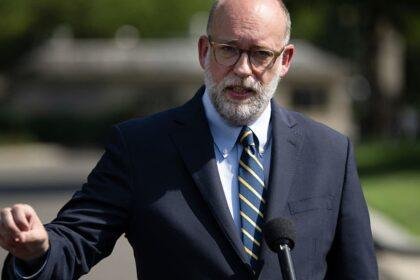Germany’s Role in Middle Eastern Diplomacy: A Focus on Israel and Hamas
In the complex landscape of Middle Eastern politics, Germany is positioning itself as a key diplomatic player, particularly in the ongoing conflict between Israel and Hamas. Johann Wadephul, a prominent German politician and member of the Bundestag, recently articulated Germany’s commitment to fostering dialogue and understanding in the region. His remarks come in the wake of significant geopolitical tensions, particularly following the tragic events of October 7, 2021, when a series of attacks resulted in the loss of approximately 1,200 lives.
Germany’s Diplomatic Engagement
Wadephul emphasized the importance of Europe in global affairs, highlighting the roles of the United Kingdom and France as permanent members of the United Nations Security Council. He noted that the European Union collectively holds significant influence, and Germany has been actively involved in diplomatic efforts. “Yesterday, I spoke with the Qatari foreign minister and prime minister-the key man in contact with Hamas,” Wadephul stated, underscoring his commitment to mediation. He plans to meet with the Egyptian foreign minister in Cairo, further illustrating Germany’s proactive approach to international diplomacy.
This engagement is not merely a matter of political obligation; it reflects a broader strategy to build bridges and foster understanding among conflicting parties. Wadephul’s assertion that he is “doing exactly what a foreign minister should” highlights the necessity of dialogue in resolving long-standing conflicts.
The Aftermath of the October 7 Attacks
The October 7 attacks marked a pivotal moment in the Israeli-Palestinian conflict, leading to a significant escalation in violence. Wadephul expressed concern that Israel’s retaliatory actions could test the limits of Western support. “At some point, people would start saying, ‘Israel is overdoing it now,'” he warned, indicating a growing sentiment among some Western nations regarding Israel’s military responses.
This sentiment is not unfounded. Historical precedents show that prolonged military actions often lead to diminishing support from allies. The international community’s response to Israel’s actions will be crucial in shaping future diplomatic relations and peace efforts.
Solidarity and Empathy in Germany
Wadephul’s reflections on solidarity demonstrations in Germany following the attacks reveal a nuanced perspective on public sentiment. While he attended these events, he noted a disappointing turnout, suggesting that “empathy wasn’t as widespread or as strong as I had hoped.” This observation points to a growing divide in public opinion regarding Israel’s policies, particularly its settlement activities in Palestinian territories.
The historical context of these sentiments is essential. Germany’s post-World War II identity has been heavily influenced by its relationship with Israel, shaped by the Holocaust and a commitment to combating antisemitism. However, as Wadephul noted, there is a “certain alienation” linked to Israel’s actions, which complicates the narrative of unconditional support.
Addressing Antisemitism in Europe
The rise of antisemitism in Europe has become a pressing issue, particularly in the context of the Israeli-Palestinian conflict. Wadephul acknowledged that while antisemitism persists, it is often exacerbated by political discourse surrounding Israel. “Some exploit it politically,” he stated, emphasizing the need to differentiate between legitimate criticism of Israeli policies and antisemitic attitudes.
This distinction is crucial for fostering a healthy political dialogue. Wadephul’s assertion that criticism of Israel can sometimes merge with antisemitic sentiments reflects a broader challenge faced by many European nations. The need for a nuanced understanding of these dynamics is essential for addressing the root causes of antisemitism and promoting a more informed public discourse.
Germany’s Commitment to Israel’s Security
Despite his criticisms, Wadephul reaffirmed Germany’s unwavering commitment to Israel’s security, stating, “Israel is our most important security partner in the Middle East-and it always will be.” This statement underscores the complexity of Germany’s position: while advocating for dialogue and understanding, it remains steadfast in its support for Israel.
This duality is not unique to Germany. Many Western nations grapple with similar challenges, balancing their historical commitments to Israel with the need to address the humanitarian concerns of Palestinians. The ongoing conflict presents a moral and political dilemma that requires careful navigation.
Conclusion
Germany’s role in the Middle Eastern diplomatic landscape is evolving, marked by a commitment to dialogue and understanding amid rising tensions. Johann Wadephul’s insights reflect the complexities of public sentiment in Germany regarding Israel and the broader implications for European foreign policy. As the international community continues to grapple with the Israeli-Palestinian conflict, Germany’s approach may serve as a model for balancing historical commitments with the need for a more nuanced understanding of contemporary issues. The path forward will require not only diplomatic engagement but also a concerted effort to address the underlying causes of conflict and promote lasting peace in the region.











